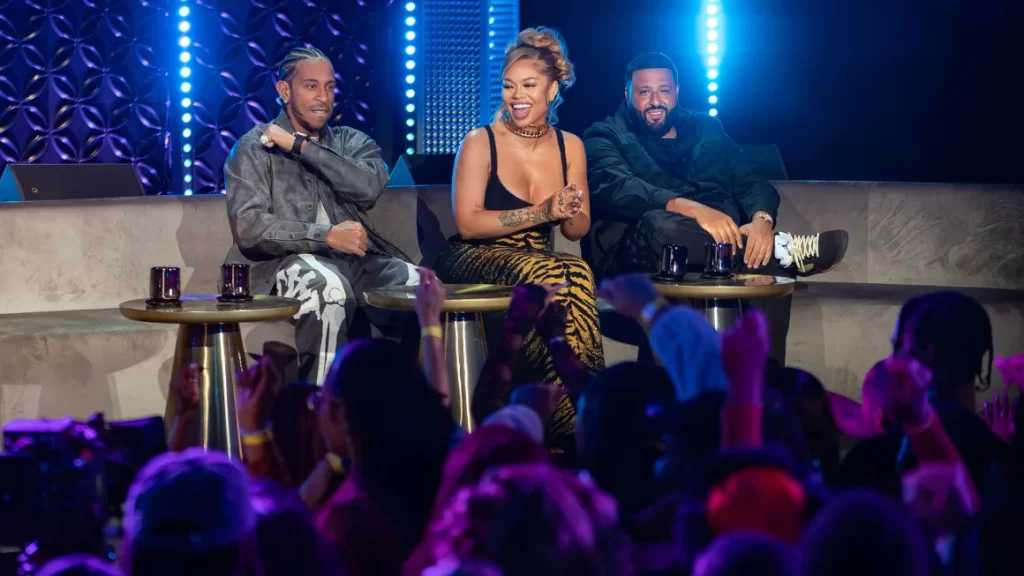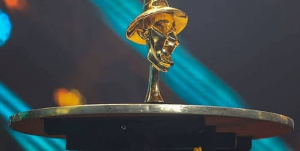‘Rhythm + Flow’ freestyles back to Netflix for Season 2
3 min read
Ludacris, Latto, DJ Khaled in Season 2 of "Rhythm + Flow." Eli Joshua Adé/Netflix
After establishing herself as a platinum-selling artist, rapper Latto is stepping into a new role as a judge for the second season of Netflix’s hip-hop competition series, Rhythm + Flow. Before her rise to stardom, Latto was a contestant on The Rap Game, and now, she’s on the other side of the stage, guiding the next generation of hip-hop talent.
Latto shared her experience with CNN, expressing both excitement and nerves about her new position. “It was fun to be on the other end of the stick,” she said. “At first, I was nervous because I was like, ‘Oh my God, I’ve been in their shoes.’ I know what that feels like when you’re put on the spot. So I was like, ‘Oh my God, I’m gonna be too soft.’” As a judge, Latto, alongside fellow hip-hop icons Ludacris and DJ Khaled, evaluates contestants who battle it out with original tracks, freestyle performances, and collaborations for a chance to win $250,000.
The competition is fierce, but behind the scenes, the contestants forge meaningful bonds. Jaxs, one of the show’s participants, reflects on the unique camaraderie among the competitors. “It is an experience that only we can understand,” said Jaxs. “Nobody else can understand this experience, only the other competitors.” This connection is a powerful theme throughout the season, with contestants sharing their personal stories and struggles as part of the competition.
Rhome, another contestant, spoke about the authenticity of the Rhythm + Flow production. “The biggest blessing about ‘Rhythm and Flow’ and Netflix is they stayed true to us,” he said. “They really were like, ‘We want to highlight the talent. We want to highlight the people that’s on the show.’” The series also highlights the often-overlooked backstories of contestants, providing an intimate look into their lives. Detroit Diamond, for example, shared her journey into music, driven by tragedy and resilience.
For Detroit Diamond, a standout moment came from connecting with the other women in the competition. “Coming into the situation and then meeting all these different women, like in my mind I’m like, yeah, everybody that’s coming can rap. You expect them to know how to rap because they made it this far,” she said. “But then once you got to actually see people perform and hear their songs and just see their personality as well, it was like, okay, yeah, in the next few years, we’re going to take off, and it’s gonna be in great hands.”
The show also shines a spotlight on the role of Atlanta in the hip-hop world. Ludacris, an Atlanta native, spoke about the city’s influence on music. “Here in Atlanta, it’s just one of those melting pots where you just see so many different styles and people using their creativity to express themselves,” he said. “That’s truly what it’s about.” Atlanta’s impact on the rap scene is undeniable, and Rhythm + Flow highlights this as it unfolds.
DJ Khaled, known for his keen ear for emerging talent, emphasized his excitement to find the next big star. “I wanted to participate in the show to hear something new,” said Khaled. “I’m looking for that new person to break new barriers.” Khaled recalled the first time he heard iconic artists like OutKast, UGK, and Jay-Z. “I remember hearing Luda for the very first time,” he added. “The man’s cadence, the man’s flow, the beat selection… I look for all that, with all these artists because it’s so much music coming out, which is a blessing.”
With the second season of Rhythm + Flow now streaming on Netflix, viewers are in for a front-row seat to a thrilling competition that’s about more than just freestyles—it’s about discovering the future stars of hip-hop, with all their talent, creativity, and passion on full display.





